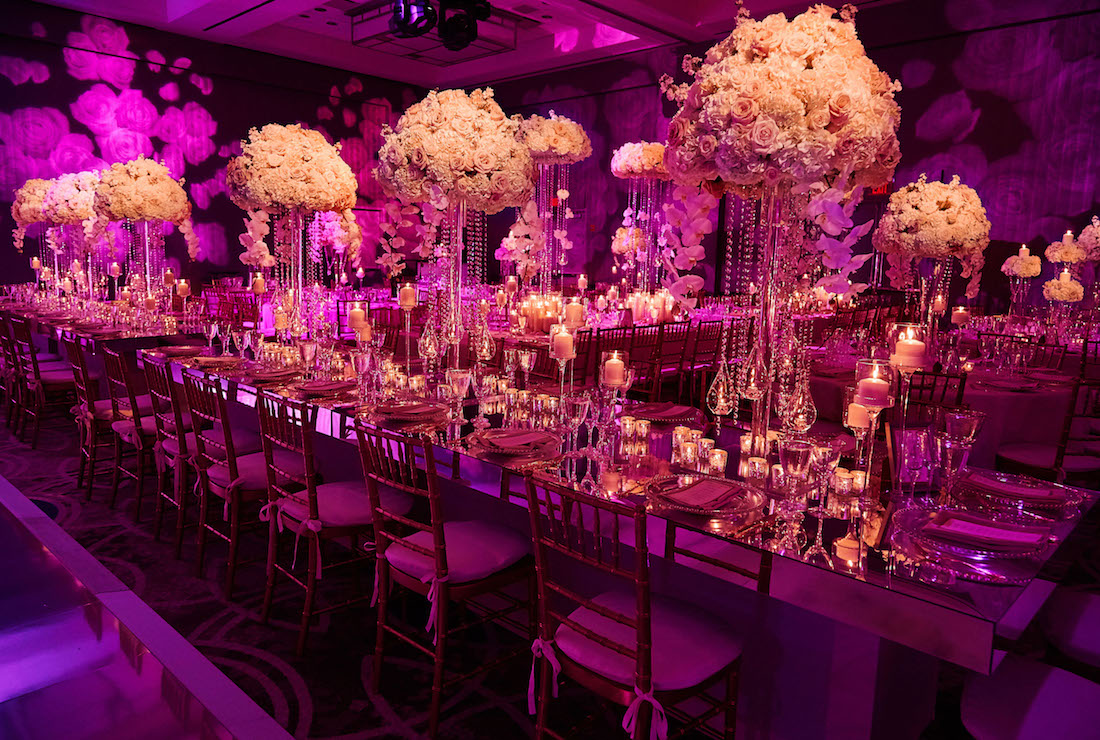
01 Jan Wedding Reception Lighting Basics
When done well, lighting can make everything look better, from your wedding cake to your guests. The right kind of illumination will also get those details you spent hours on noticed, create awesome photo ops (hello, sparklers!) and allow you to spend less on the rest of the décor. It really is that impactful. We like to think of lighting as the jewelry of a space—just as a certain mix of baubles can make an outfit, the right lights will make your reception unforgettable. Here’s the right way to plan your lighting.
Choosing Your Glow
You love candlelight, but the country club has a strict no-openflame policy. Or you want to string hundreds of twinkle lights over your outdoor tables, but a lack of outlets makes that a very expensive idea. Your lighting must be a match for both your budget and your wedding venue. Before you get your heart set on a specific style of illumination, talk to a lighting designer. You’ll probably have to bring in a specialist for lighting since most venues don’t offer this service. But engaging a pro has its perks. See if your space can recommend someone who has partnered with them in the past—that person will be familiar with the location’s sore spots, built-in lighting and power capabilities. Most experts can make suggestions and show you before-and-after pictures of various lighting arrangements too.
Find Your Pro
There are a couple ways to find your wedding lighting specialist. First, ask your event designer or wedding florist, many do their own lighting. If not, they may have a lighting pro they regularly work with. Or, the coordinator at your reception venue could probably recommend a lighting company that has worked with the site before—and ask to see pictures of the space transformed by various lighting arrangements. Don’t be surprised if your lighting designer has a background in theater, many experts are using the same technology and techniques in weddings that they honed creating dramatic sets for the stage.
Inside vs. The Great Outdoors
Where you celebrate will greatly impact the kind of lighting you’ll need. Before settling on a concept, try to plan a site visit for the same time of day as your wedding—you’ll get a better idea of how bright the afternoon sun on the lawn really is and how much built-in lighting already exists in the ballroom. If you’re hosting indoors, you’ll want to walk the space with your lighting vision in mind—and, better yet, with a pro by your side. Even if the space has sufficient built-in lighting, additional options (like hanging chandeliers) may help convey the vibe you’re after. Look around the room and see where the fixed lighting is focused.
Hosting outdoors? Visit after dark. This will help you identify what needs to be illuminated in order to keep your reception safe, plus what might set a mood for your guests. Take note of outdoor outlets and ask your venue if permits are needed. Do your best to stay away from floodlights or anything fluorescent. In both cases, take note of limitations and try to come up with alternative options. If you’re hosting a wedding at home, discuss how much electricity your lighting designer is going to need. Your band or DJ will probably have to tap into your home’s power for their speakers, and you don’t want to risk blowing a fuse. If your lighting expert is concerned that there won’t be enough power to go around, they may consider bringing a generator, which should be kept well out of earshot.
Learn Lighting Lingo
Here are the types of lighting commonly used at weddings.
Pin spot: A focused beam of light that shines directly onto an object, like a centerpiece or wedding cake, as a highlight effect.
Color wash: Basically a blanket of colored light covering an entire area to create a mood or change the look of built-in décor.
Gobos: Circular stencils that are put over a light to project a design or pattern onto a wall, ceiling or floor. Monograms, dates and wedding motifs are popular gobo designs.
Led: Short for “light-emitting diode,” LED lights use much less electricity than (and don’t get as hot as) regular incandescent lightbulbs. They can also be wireless, which makes them even more discreet. LEDs are great for color changes and vibrant hues.
String lighting: A strand of LED lights that can create a magical effect (think Christmas or market lights). An installation can be labor-intensive, but the lighting itself is fairly budget-friendly.
Lighting by Style
Now that you’ve got all the tips and tricks, learn what type of lighting is best for your wedding style.
Your Wedding Style: Classic
Many classic reception spaces are outfitted with gorgeous fixtures, like crystal chandeliers and wall sconces, that add elegant ambience to a space at no extra cost. If you’re looking to up the glitz, add silver candelabras to dining tables—they’ll give off a soft glow and serve as decoration. Keeping things more modern? Fill glass hurricanes with pillar candles for the same romantic effect. Consider adding a monogram to your dance floor with a gobo, or use a spotlight to show off a raw bar, an ice sculpture or a gorgeous cake. If you’re dining and dancing under the stars, twinkle lights are pure magic. And don’t forget to end the evening on a high note with a classic sparkler send-off, venue permitting.
Your Wedding Style: Rustic
Saying “I do” in a barn? Start with market lights. These globestyle strands add a bit of whimsy to outdoor spaces. They’re larger than twinkle or Christmas lights, so each bulb provides a generous amount of illumination while also creating a charming atmosphere. Line ceremony aisles or outdoor pathways with luminaries—the simple paper bags will make a big statement. If you’re going for a more eclectic look, opt for a unique chandelier treatment (think mason jars or Edison bulbs) or mix a few styles of lighting. Make an open space feel more intimate by designating spaces within the venue, like hanging a chandelier over the lounge area or creating a ceremony backdrop with suspended paper star lanterns.
Your Wedding Style: Romantic
Enhance your picturesque plantation home or castle with twinkle lights. These tiny bulbs sparkle! Hang them vertically to create a ceremony backdrop, or drape them from a tent for a canopy or starry-sky effect. If you’re celebrating outdoors, consider suspending lanterns from trees, or use them to light pathways. (Mini lanterns could also make cute escort cards.) Chandeliers make any setting feel more intimate, while pink color-wash lighting will give your whole space a romantic, rose-colored glow. At the end of the evening, ask guests to send wish lanterns into the night sky with a wish for your future.
Your Wedding Style: Modern
Add a party vibe to an unfinished modern space (a gallery, a city loft) with color-wash lighting. Opt for hues that flatter skin tones, such as pinks and purples, and let them build in intensity over the course of the evening. Sleek, pre-lit tables, which literally glow from within, offer a warm but contemporary feel. Consider adding LED lights to floral arrangements for luminous stems that double as décor and mood lighting. Illuminate venue walls with a cool gobopatterneffect, or project tiny stars on the ceiling above the dance floor. A moving design or video projection of blooming florals or a bustling cityscape is another cool, techy option.
Your Wedding Style: Edgy
Planning to exchange vows in a converted warehouse or historic building? Play up your unique style with lighting that matches. Use uplighting to draw attention to architectural details or add a wash of color to the space. For table lighting, look to clusters of iron lanterns, which can double as illumination and centerpieces. Or incorporate an Edison bulb chandelier for a more retro look. Personalize your ceremony space with a custom marquee sign or strands of vertical market lights. Hosting an after-party? Have some fun with ’90s-style glow sticks, or ask your bartender to slip LED cocktail stirrers into your signature sip for a festive nightcap



